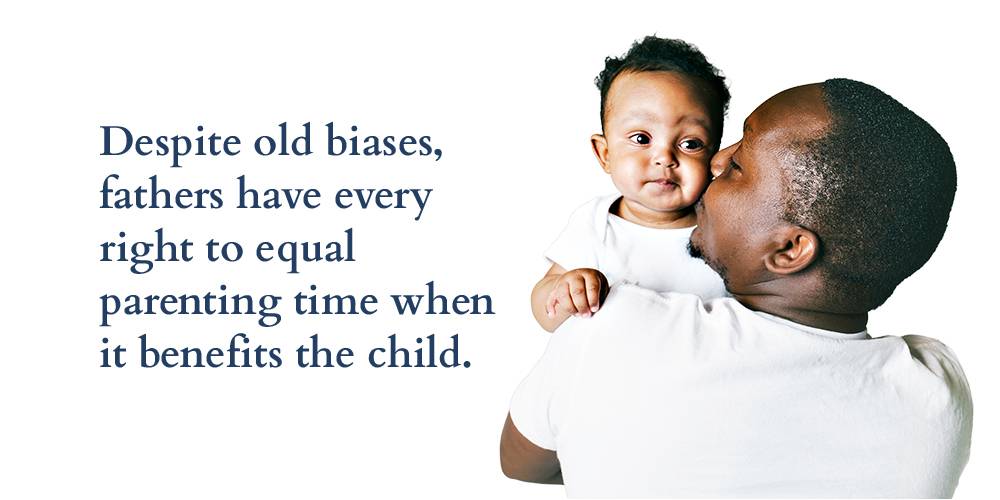Do Dads Still Get the Short End of Custody and Visitation?
 Across the United States, custody arrangements have been evolving for decades. Gone are the days when custody was almost automatically given to mothers. Still, many fathers still feel like they face an uphill battle.
Across the United States, custody arrangements have been evolving for decades. Gone are the days when custody was almost automatically given to mothers. Still, many fathers still feel like they face an uphill battle.
Nationally, fathers receive about 35 percent of parenting time. In Illinois, the number is even lower, with studies showing fathers averaging only about 23 percent of custody time. While the law today is supposed to be gender-neutral and focused on what is best for the child, the perception, and sometimes the reality, is that dads do not always get the chance to have equal time with their kids.
Why does this situation persist? For much of the 20th century, the "tender years doctrine" shaped custody outcomes. That doctrine suggested that very young children, particularly infants and toddlers, were best cared for by their mothers. In Illinois, as in most other states, the tender years doctrine was eliminated by the 1970s in favor of a child-centered standard. Since then, courts have been required to consider a wide range of factors to decide what custody arrangement will best serve the child when parents cannot decide on their own.
Still, while the law is not biased against fathers, reality does not always reflect this. Judges are people, and people bring personal assumptions into the courtroom. Some fathers walk away from custody proceedings feeling like their role as parents was not valued equally. That is why working with an experienced DuPage County child custody lawyer is so important. At the Law Office of Ronald L. Hendrix, P.C., we know how important advocacy is for fathers who want strong relationships with their children. Our firm offers free consultations and has extensive experience in high-conflict custody disputes.
How Is Child Custody Determined in Illinois?
To begin with, Illinois no longer uses the term "custody." Instead, courts decide on the "allocation of parental responsibilities" and "parenting time." This reflects two separate but related parts of parenting after divorce. Parental responsibilities is the decision-making authority in areas like education, healthcare, religion, and extracurricular activities. Parenting time is the schedule of the time that a child spends with each parent.
Whenever possible, parents should try to put these two factors together into a "parenting plan" that they create on their own. When parents cannot get along or there are questions about a child’s safety, the Illinois Marriage and Dissolution of Marriage Act (750 ILCS 5/602.5 and 5/602.7) lays out the factors judges must use when making parenting plans.
These include, but are not limited to:
-
The mental and physical health of the parents
-
Each parent’s ability to make good decisions for the child
-
The level of conflict or cooperation between parents
-
The needs and wishes of the child
-
The involvement of each parent in the child’s day-to-day life
-
Each parent’s history of taking care of the child
-
How far away parents live from each other
-
Any history of domestic violence
-
Each parent’s willingness to encourage a strong relationship between the child and the other parent
Do Biases Against Fathers Still Exist in Custody Decisions?
Despite the shift away from the "tender years" doctrine, many fathers still feel disadvantaged in custody battles. Some of this stems from the fact that in many families, mothers remain the primary caregivers, especially for very young children. If one parent has been handling most of the school pick-ups, medical appointments, and bedtime routines, courts often conclude that keeping things the same is in the child’s best interests.
At the same time, there are many fathers who share or even lead caregiving. Fathers today are more involved in their children’s daily lives than at any other time in history. In those cases, there is no legal reason why a father should not be awarded equal parenting time. The challenge is showing that involvement clearly and persuasively to the court.
How Can Dads Get Shared Parenting Time in Illinois?
A 50/50 parenting time arrangement is possible in Illinois and is becoming increasingly common. But it is not automatic. Courts always consider whether the parents live close enough to make the schedule realistic, whether they can cooperate without exposing the child to conflict, and whether the arrangement will meet the child’s needs. If one parent moves far away, or if the relationship between the parents is poor, equal parenting time may not be realistic.
Still, many judges understand how important it is for both parents to be involved. Illinois law explicitly says that it is presumed to be in the child’s best interests to have a strong relationship with both parents. Fathers who want equal time should be prepared to show the court why that arrangement will serve their child best.

Can Kids Decide to Spend More Time with Their Dad?
As children get older, their opinions become more important in custody cases. Illinois law does allow judges to consider a child’s wishes if the child is mature enough. This does not mean the child gets to choose outright, but what they think does matter. Fathers should understand that building a consistent, positive bond with their children is not only good for their relationship but can also influence the outcome of a case.
Contact an Experienced DuPage County, IL Child Custody Attorney
Custody outcomes in Illinois have been slowly shifting over the years. More fathers are getting parenting time, and judges are more and more aware of the importance of enabling both parents to be involved in their child’s life. Yet the statistics still show that fathers are behind mothers on average in terms of parenting time.
At the Law Office of Ronald L. Hendrix, P.C., we believe every parent deserves a fair chance to raise their child. Our team has decades of experience in child custody cases, and we know how to fight unfair assumptions so we can get outcomes that reflect how important dads are to their kids.
We stand ready to help fathers protect their rights and their children’s best interests. Call us at 630-355-7776 today to schedule your free consultation with one of our experienced Naperville, IL fathers’ rights lawyers.

















